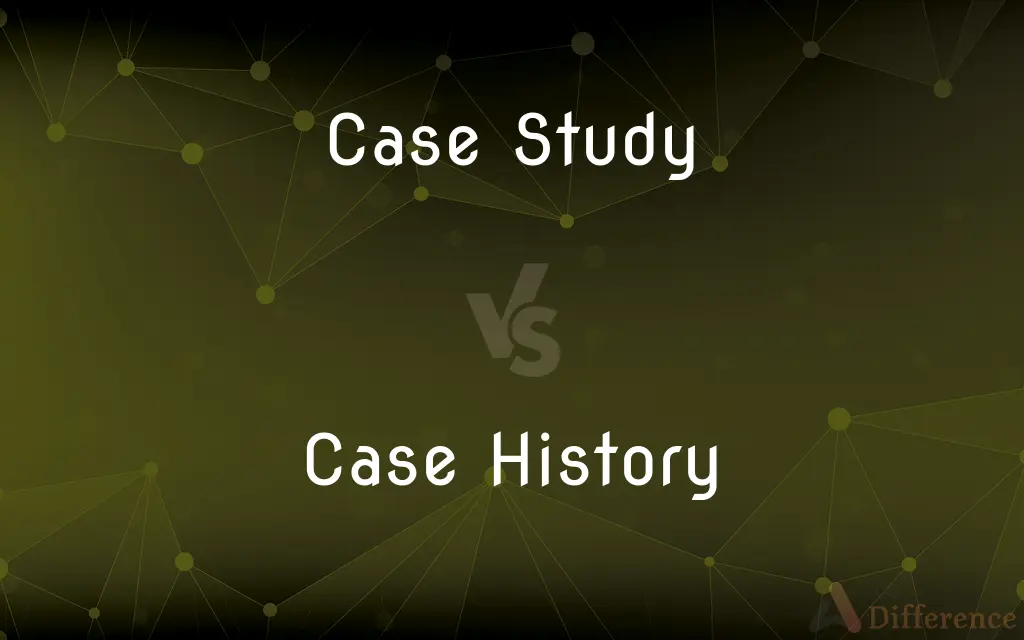Case Study vs. Case History — What's the Difference?
By Tayyaba Rehman & Fiza Rafique — Published on October 29, 2023
A case study is an in-depth analysis of a specific subject or situation for research, while a case history refers to a detailed record of events or problems associated with an individual or entity.

Difference Between Case Study and Case History
Table of Contents
ADVERTISEMENT
Key Differences
A case study and case history, while sounding similar, serve different academic and professional purposes. A case study typically focuses on the detailed examination of a specific subject, situation, or phenomenon. Researchers use case studies to explore, analyze, and understand complex issues within real-life contexts. This method is particularly valuable in situations where a unique or special instance needs to be illuminated.
On the other hand, a case history is more about chronicling events, problems, or the medical background of an individual or entity. In medical and psychological fields, professionals document the history of a patient's condition, treatments, and outcomes. This record provides valuable insights into the individual's health and can guide future care or interventions.
In terms of application, case studies often become the subject of academic papers, journal articles, or business presentations. They can span various fields, from business and sociology to medicine and psychology. Case histories, meanwhile, are typically kept as records within institutions, aiding continuity in care or serving as references in diagnosing and treating conditions.
Although both terms involve a thorough look into particular subjects, the difference lies in their intent. While a case study seeks to provide broader insights or contribute to knowledge in a field, a case history is primarily a comprehensive record for future reference.
Comparison Chart
Primary Purpose
Research or analysis.
Record of events or problems.
ADVERTISEMENT
Common Fields
Business, psychology, sociology.
Medicine, psychology.
Detail Level
In-depth examination of a specific topic.
Comprehensive record of an individual's history.
Usage
Academic papers, journal articles, presentations.
Patient files, institutional records.
Intent
Understand complex issues, contribute to knowledge.
Guide future care, diagnose, treat conditions.
Compare with Definitions
Case Study
A case study focuses on a single entity or phenomenon.
The case study highlighted the city's unique approach to waste management.
Case History
It provides insights into past conditions and treatments.
The case history showed a recurring pattern of symptoms.
Case Study
A case study can span various disciplines.
The business school often discussed case studies of successful startups.
Case History
It details the background and past experiences of an individual or entity.
The therapist reviewed the case history to understand the patient's trauma.
Case Study
It's a research methodology for exploring complex issues.
The psychologist chose a case study approach to understand the patient's behavior.
Case History
A case history is a record of events or problems.
The doctor referred to the patient's case history before recommending treatment.
Case Study
It provides detailed insights based on real-life contexts.
The case study revealed the challenges faced by remote workers.
Case History
A case history aids in continuity of care.
Without the patient's case history, the new doctor would be unaware of the allergies.
Case Study
A case study is an in-depth examination of a subject.
The professor presented a case study on the company's rapid growth.
Case History
A case history is crucial in medical and psychological fields.
A detailed case history helps in accurate diagnosis.
Common Curiosities
Why is a case history important in psychology?
A case history provides insights into an individual's past experiences, aiding in diagnosis and treatment.
What is the main purpose of a case study?
A case study's primary purpose is in-depth research or analysis of a specific subject or situation.
Can a case study focus on multiple subjects?
Typically, a case study focuses on a single subject, but it can consider multiple aspects of that subject.
Are case studies based on real-life situations?
Yes, case studies typically focus on real-life subjects or situations to provide in-depth analysis.
Can businesses use case studies?
Yes, businesses often use case studies to analyze strategies, products, or market scenarios.
How is a case history used in the medical field?
A case history provides a detailed record of a patient's medical conditions, treatments, and outcomes, guiding future care.
Do case histories include personal details?
Yes, case histories often contain personal and sensitive information, especially in medical contexts.
How do case studies contribute to academic knowledge?
Case studies offer detailed insights into specific topics, enriching the understanding and literature of a field.
Can a case study be fictional?
Genuine academic case studies are based on real situations, but fictionalized ones might be used for teaching purposes.
Is a case history public information?
No, case histories, especially in medical and psychological fields, are confidential.
What fields commonly use case histories?
Medicine and psychology frequently use case histories to document patient backgrounds.
How long can a case study be?
The length varies, but a case study can be extensive, spanning several pages or even a book.
Are case studies and case histories interchangeable terms?
No, while both provide detailed looks at subjects, their intents and applications differ significantly.
Is a case history only about negative events or problems?
No, a case history chronicles both positive and negative events, providing a comprehensive view.
Do case histories assist in pattern recognition?
Yes, reviewing case histories can help professionals recognize patterns or trends in conditions or behaviors.
Share Your Discovery

Previous Comparison
Will Be vs. Will Have
Next Comparison
Buffered RAM vs. Unbuffered RAMAuthor Spotlight
Written by
Tayyaba RehmanTayyaba Rehman is a distinguished writer, currently serving as a primary contributor to askdifference.com. As a researcher in semantics and etymology, Tayyaba's passion for the complexity of languages and their distinctions has found a perfect home on the platform. Tayyaba delves into the intricacies of language, distinguishing between commonly confused words and phrases, thereby providing clarity for readers worldwide.
Co-written by
Fiza RafiqueFiza Rafique is a skilled content writer at AskDifference.com, where she meticulously refines and enhances written pieces. Drawing from her vast editorial expertise, Fiza ensures clarity, accuracy, and precision in every article. Passionate about language, she continually seeks to elevate the quality of content for readers worldwide.
















































